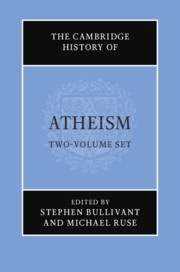Book contents
- The Cambridge History of Atheism
- The Cambridge History of Atheism
- Copyright page
- Dedication
- Contents
- Acknowledgments
- Contributors
- Introduction
- Part I Preliminaries
- Part II Atheisms in History
- Part III Reformation, Renaissance, Enlightenment
- Part IV Classical Modernity: Philosophical and Scientific Currents
- Part V Classical Modernity: Social and Political Currents
- Part VI Twentieth and Twenty-First Centuries: Intellectual and Artistic Currents
- 32 Analytic Philosophy
- 33 Naturalism
- 34 Existentialism
- 35 Atheism and Postmodern Philosophies
- 36 Ayn Rand and Objectivism
- 37 Darwinism
- 38 Literature
- 39 Music
- 40 Visual Arts
- 41 Film and Television
- Part VII Lived Atheism in the Twentieth- and Twenty-First Centuries: Case-Studies
- Part VIII Emerging Atheisms in the Twenty-First Century
- Part IX Conclusion
- Index
- References
35 - Atheism and Postmodern Philosophies
from Part VI - Twentieth and Twenty-First Centuries: Intellectual and Artistic Currents
Published online by Cambridge University Press: 25 September 2021
- The Cambridge History of Atheism
- The Cambridge History of Atheism
- Copyright page
- Dedication
- Contents
- Acknowledgments
- Contributors
- Introduction
- Part I Preliminaries
- Part II Atheisms in History
- Part III Reformation, Renaissance, Enlightenment
- Part IV Classical Modernity: Philosophical and Scientific Currents
- Part V Classical Modernity: Social and Political Currents
- Part VI Twentieth and Twenty-First Centuries: Intellectual and Artistic Currents
- 32 Analytic Philosophy
- 33 Naturalism
- 34 Existentialism
- 35 Atheism and Postmodern Philosophies
- 36 Ayn Rand and Objectivism
- 37 Darwinism
- 38 Literature
- 39 Music
- 40 Visual Arts
- 41 Film and Television
- Part VII Lived Atheism in the Twentieth- and Twenty-First Centuries: Case-Studies
- Part VIII Emerging Atheisms in the Twenty-First Century
- Part IX Conclusion
- Index
- References
Summary
‘Postmodernism’ was once very much in vogue, although it has recently experienced something of an eclipse. This is true in the field of philosophy, as in various other fields, including literature, art, music, architecture, and theology. Initially emerging as a recognized term in the late 1970s, postmodernism became especially prominent in the 1980s, 1990s, and into the new millennium. But although postmodernism in philosophy has given way to various other movements, including new materialism, speculative realism, ‘new Hegelianism’, and revivified forms of Platonism, to name but a few, these new philosophies would have been inconceivable without the postmodernism out of which they emerged. Furthermore, many of what were once the most controversial claims of postmodernism have now been largely accepted and taken as commonplace. In this sense, postmodernism continues to cast long shadows, even at a time when its own name is rarely invoked. The question of its relationship to atheism is a fascinating and ambivalent one, with some seeing postmodernism as inherently atheistic, and others regarding it as undermining and destabilizing all atheistic claims.
- Type
- Chapter
- Information
- The Cambridge History of Atheism , pp. 632 - 646Publisher: Cambridge University PressPrint publication year: 2021



